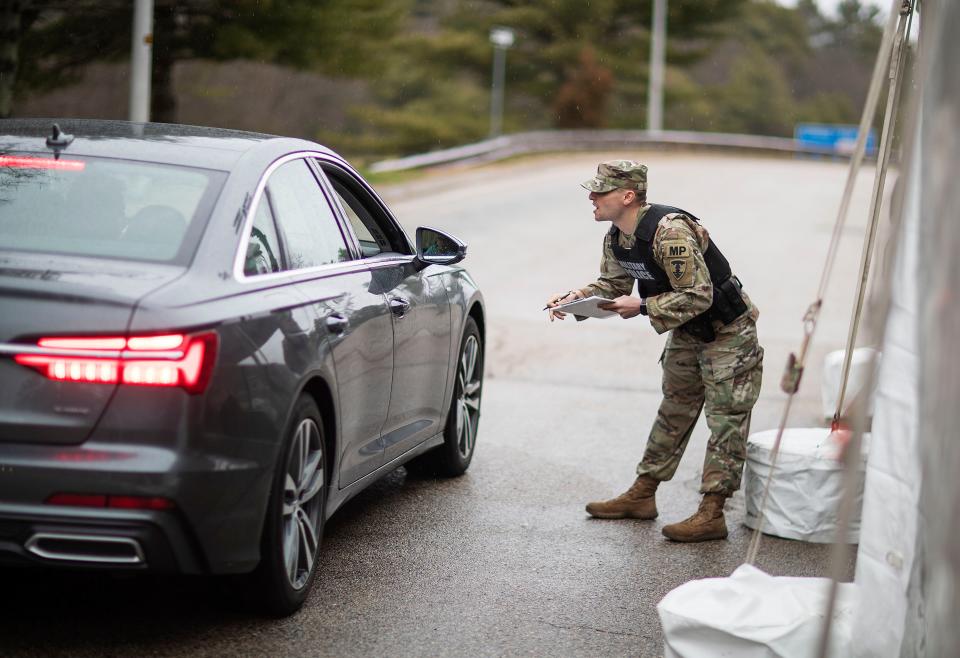Trump can't enforce state lockdowns. Contain the coronavirus, but protect our rights, too.
President Donald Trump recently floated the idea of an “enforceable” quarantine of New York, Connecticut and parts of New Jersey. He backed off the idea and settled, this time, for a travel advisory issued by the Centers for Disease Control discouraging people in those states from traveling domestically. But could he have done that? Could he have locked down 32 million people with a stroke of his pen?
While America hasn’t experienced anything like the coronavirus pandemic in living memory, infectious disease epidemics were all too common in the first half of the 20th century. Polio, typhoid, influenza, measles and diphtheria all presented major health threats at one time or another. Vaccines and improved public health standards have made these diseases a matter for historians. Nonetheless, the lessons learned about controlling these outbreaks remain embedded in our laws.
And they barely involve the federal government at all. In most states, the first line of defense is the county public health officer. While that is typically a non-controversial position, when there is an infectious disease outbreak like COVID-19, county public health officers become the most powerful officials in the government. They have enormous authority to take steps they deem necessary to control the outbreak.
If the county public health officer decides schools need to be closed, the schools are closed. If the county public health officer decides businesses need to shutter and public events need to be canceled, then that’s what happens. In some states, the state public health officer can issue similar orders, if necessary.
'Cheerleader' federal government
County public health officers also have a great deal of authority to isolate those who have the disease and, in order to prevent its spread, quarantine people who may have been exposed to it until the risk of them developing the infection has passed. Experience teaches that these decisions need to be made and enforced by people who understand the situation on the ground in their communities rather than on a one-size-fits-all basis.
Which brings us to the federal government. During an epidemic, the federal government’s role is cheerleader in chief. Its main responsibilities are coordination and communication. Rather than taking charge, it is supposed to be ensuring that health care providers and state and local officials have the resources and the information they need to treat the sick and make wise decisions. What little direct power the federal government does have is found in the Public Health Service Act. The federal government’s quarantine powers are limited to preventing the spread of a disease across the U.S. border and to preventing its interstate spread.

But these powers can only be applied on an individual basis. The statute and the overly-expansive regulations that go with it make it clear that the federal government can only order quarantines on an individual basis and based on a reasonable belief that the person in question is likely to become infectious. The government must then provide some rudimentary due process to the quarantined individual who can contest his or her status.
Social distancing works: San Francisco is beating the coronavirus odds — so far. What can other places learn?
What the federal government cannot do is order millions of people locked down based solely on the state in which they live. Not only would that be unconstitutional, there is neither statutory nor regulatory authority for doing such a thing – and the federal government wrote the regulations itself.
Be careful with our basic freedoms
A crisis like the coronavirus pandemic is always a dangerous time for civil liberties. When governments become habituated to exercising powers, it can be difficult to get them to relinquish them once the crisis has passed. In the words of Judge Alex Kozinski, “Liberty — the freedom from unwarranted intrusion by government — is as easily lost through insistent nibbles by government officials who seek to do their jobs as by those who sole purpose it is to oppress; the piranha can be as deadly as the shark.” Trump’s casual assumption that he had the power to control the lives of over 30 million people, even if he had the best of intentions, is a perfect example of what Judge Kozinski warned us about.
He does it so you don't have to: Why I watch Trump's daily coronavirus briefings (and no, it's not because I'm a masochist)
Worse, it’s part of a pattern. The Trump administration is also using this crisis to propose sweeping new government powers during an emergency. These include allowing people to be held indefinitely without ever coming before a judge and authorizing mandatory “private arraignments” by video conference in criminal cases even when there is no emergency.
The pandemic now gripping America is one of the gravest challenges most of us have faced in our lifetimes. But in a few months or a year, it will pass. And unless we are mindful now, the damage done in the name of expediency to some of our most basic freedoms could last far longer than that. There is no need to let that happen. Medical science teaches us the need for social distancing. But distancing ourselves from the Constitution and the rule of law is no remedy at all.
Chris Truax, an appellate lawyer in San Diego, is a legal adviser to Republicans for the Rule of Law and a member of USA TODAY's Board of Contributors.
You can read diverse opinions from our Board of Contributors and other writers on the Opinion front page, on Twitter @usatodayopinion and in our daily Opinion newsletter. To respond to a column, submit a comment to letters@usatoday.com.
This article originally appeared on USA TODAY: Trump's coronavirus state lockdowns would violate law and Constitution

